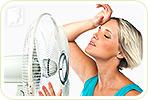Often lasting for the entire menopause transition and affecting 80% of American women, hot flashes are one of menopause's most prevalent and persistent symptoms. Commonly, the experience manifests itself as the sudden sensation of intense heat and is the consequence of naturally-occurring hormone imbalances and estrogen reductions.
Many women experiencing hot flash episodes - which can occur more than a dozen times a day in severe cases - understandably desire immediate remedies. Unfortunately, though, the sensation of hot flash can't be avoided entirely. However, by adopting simple techniques and making lifestyle alterations, it is possible to reduce the symptom.
Clothing Choice
Opting for layered, easily removable outfits is essential to ensuring you are prepared to deal with sudden hot flash experiences. Natural, breathable fabrics such as cotton can also play a key role in counteracting your body's excess perspiration and keeping you cool.
Breathing
Practice breathing exercises so that when you feel an incoming hot flash, you are able to take actions that calm your body.
Cool Room
Install air conditioning or keep a fan in your living and working environments, sleep with light covers at night, and avoid hot baths. These methods will allow you to regulate the temperature of your environments and body correspondingly.
Hydration
Drinking plenty of water is always advisable, but when you are experiencing hot flashes, it becomes essential, as much is lost through sweating. Keeping a glass or bottle of water with you is a wise practice to adopt, as drinking water will also cool your body temperature.
Diet
Spicy foods, caffeine, and alcohol are all well-known hot flash triggers. If you are struggling to completely eliminate these items from your diet, it is advised to begin by reducing your intake.
Exercise
By maintaining a regular exercise routine, you will ensure your body is better equipped to deal with hot flash episodes.
Hormone-regulating Supplements
Recommended by health professionals and taken by many women, certain supplements nourish your hormonal glands and prompt them to produce additional natural hormones. This, in turn, reduces hormonal imbalances and hot flashes.
Medications
In severe cases, women can consider replacing the estrogen they are losing through estrogen replacement therapies and medication. However, the practice should be reserved as a last resort, as it is often accompanied by undesirable side effects. For more advice, talk with your doctor about your available options.
Although it might not be possible to stop hot flashes entirely, by making small lifestyle changes, it can become easier to manage hot flash sensations and reduce their frequency and severity. Follow the link below to discover more information on how to treat hot flashes.
Sources
- Sikon, A. & Thacker, H. (2004). Treatment for Menopausal Hot Flashes. Cleveland Clinic Journal of Medicine, 71(7).
- "Hot flashes ... in January". Canadian Medical Association Journal. 2004: 170 (1).
- Miller, Heather and Rose Maria Li, M.D. "Measuring Hot Flashes: Summary of a National Institutes of Health Workshop". Conference report. Mayo Clinic. June 2004: 79.



